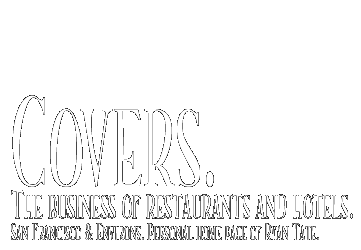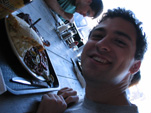The eternal wait for big expense accounts
I had lunch today at Cafe Bastille with two hotel money guys.
They explained, to my surpise, that investors are lining up to buy hotels in this city at aggressive prices. Around the start of the year, several hotels traded in rapid succession, including the Four Seasons, Argent, Park Hyatt, Pan Pacific and St. Francis.
Apparently more deals are on the way. And prices are still in nosebleed territory.
I pointed out that, if anything, money to finance these deals should be harder to come by than it was nine months ago given interest rate trends and the price of the 10-year Treasury bond, which has added half a percentage point of return over the last year.
Then they said something funny. The deals aren't being driven by the fundamentals. The cap rate, or annual return on investment, for some deals looks to be below 4 percent. In other words, you could buy 10 year U.S. Treasury bonds, now at about 4.6 percent, and get more bang for your buck.
How do you justify a risky hotel purchase that earns you less than bonds guaranteed by the U.S. goverment?
By drawing a line that goes up and to the right.
Hotel buyers are projecting that hotel revenues will rise sharply, boosting that return. For the first five months of this year, revenue per available hotel room in San Francisco was up $13 to $120 -- more than 10 percent. If another round of aggressive deals emerges as predicted, sales will need to rise further.
I just don't understand how that can happen. Revenue gains the past three years were driven by modest but steady growth in tourism, including a big spike in international travel. Foreigners are coming due to the weak dollar and economic recovery in Japan. U.S tourists are shaking off 9/11 jitters and spending money thrown off by steady economic growth.
Then there are the conventions, which have been especially strong the last three years.
But the dollar is strengthening, the convention cycle at a low ebb next year and sources of further domestic tourism growth uncertain. San Diego is putting pressure on the city for future conventions. More hotel capacity is coming online with the 550-room Intercontinental now under construction, plus two new fractional ownership hotels from Ritz-Carlton and Fairmont.
That leaves the business traveler as a source for growth -- the people with fat expense accounts. They're the last major group of visitors who still haven't returned to the city.
And everyone is chasing them. The return of the big expense account is needed not only to justify high hotel prices but also flagship restaurants. Pat Kuleto's $18 million restaurants, with 400 seats between them, will have a hard time selling enough steaks and exotic fish to tourists and locals alone, no matter how many condo units go up on nearby Rincon Hill.
The convention and visitors bureau wants more flagship restaurants to stoke tourist growth, but as Michael Dellar told me it's hard to launch a flagship restaurant when you aren't selling to the fat crowd of expense accounters you have in New York or the drunk gambling money you have in Las Vegas. I guess he's crossing his fingers there will be enough business at the steakhouse he's opening in Westfield's Emporium redevelopment.
New York has expense accounts in its restaurants and businessmen in its hotels because of banking and media. Those are social, deal-driven industries. You need face-to-face meetings. If you're a local, that means frequenting restaurants. If you're from out of town, it means you need to fly in to close transaction.
San Francisco was a banking powerhouse in the 80s but the industry has been waning. Bank of America was acquired and large numbers of staff moved to North Carolina. Robetson Stephens closed. Charles Schwab's recent history has been a tally of successive layoff rounds.
The only real media biz in San Francisco was confined to the dot-com days, when the city was teaming with advertising-driven startups that are long gone, CNET not withstanding.
Will the business executives of San Francisco's future eat out more? Not likely. What are the growth industries? Biotech, digital entertainment? I don't buy it. The biotech guys can do their jobs in their labs, heads down. The key communication takes place using hard data in methodically assembled journals or tightly-controlled formal data sharing between organizations.
The digital entertainment guys, like Wild Brain and Giant Killer Robots, are not Hollywood moguls. They have polygons and server farms instead of actors and agents. A programmer living off ramen noodles can have more impact than a well-connected producer. I'm not saying they don't eat out -- I'm saying they don't need to eat out to do their jobs.
That's why the expense account is not returning to this city, as much as I wish it were.
They explained, to my surpise, that investors are lining up to buy hotels in this city at aggressive prices. Around the start of the year, several hotels traded in rapid succession, including the Four Seasons, Argent, Park Hyatt, Pan Pacific and St. Francis.
Apparently more deals are on the way. And prices are still in nosebleed territory.
I pointed out that, if anything, money to finance these deals should be harder to come by than it was nine months ago given interest rate trends and the price of the 10-year Treasury bond, which has added half a percentage point of return over the last year.
Then they said something funny. The deals aren't being driven by the fundamentals. The cap rate, or annual return on investment, for some deals looks to be below 4 percent. In other words, you could buy 10 year U.S. Treasury bonds, now at about 4.6 percent, and get more bang for your buck.
How do you justify a risky hotel purchase that earns you less than bonds guaranteed by the U.S. goverment?
By drawing a line that goes up and to the right.
Hotel buyers are projecting that hotel revenues will rise sharply, boosting that return. For the first five months of this year, revenue per available hotel room in San Francisco was up $13 to $120 -- more than 10 percent. If another round of aggressive deals emerges as predicted, sales will need to rise further.
I just don't understand how that can happen. Revenue gains the past three years were driven by modest but steady growth in tourism, including a big spike in international travel. Foreigners are coming due to the weak dollar and economic recovery in Japan. U.S tourists are shaking off 9/11 jitters and spending money thrown off by steady economic growth.
Then there are the conventions, which have been especially strong the last three years.
But the dollar is strengthening, the convention cycle at a low ebb next year and sources of further domestic tourism growth uncertain. San Diego is putting pressure on the city for future conventions. More hotel capacity is coming online with the 550-room Intercontinental now under construction, plus two new fractional ownership hotels from Ritz-Carlton and Fairmont.
That leaves the business traveler as a source for growth -- the people with fat expense accounts. They're the last major group of visitors who still haven't returned to the city.
And everyone is chasing them. The return of the big expense account is needed not only to justify high hotel prices but also flagship restaurants. Pat Kuleto's $18 million restaurants, with 400 seats between them, will have a hard time selling enough steaks and exotic fish to tourists and locals alone, no matter how many condo units go up on nearby Rincon Hill.
The convention and visitors bureau wants more flagship restaurants to stoke tourist growth, but as Michael Dellar told me it's hard to launch a flagship restaurant when you aren't selling to the fat crowd of expense accounters you have in New York or the drunk gambling money you have in Las Vegas. I guess he's crossing his fingers there will be enough business at the steakhouse he's opening in Westfield's Emporium redevelopment.
New York has expense accounts in its restaurants and businessmen in its hotels because of banking and media. Those are social, deal-driven industries. You need face-to-face meetings. If you're a local, that means frequenting restaurants. If you're from out of town, it means you need to fly in to close transaction.
San Francisco was a banking powerhouse in the 80s but the industry has been waning. Bank of America was acquired and large numbers of staff moved to North Carolina. Robetson Stephens closed. Charles Schwab's recent history has been a tally of successive layoff rounds.
The only real media biz in San Francisco was confined to the dot-com days, when the city was teaming with advertising-driven startups that are long gone, CNET not withstanding.
Will the business executives of San Francisco's future eat out more? Not likely. What are the growth industries? Biotech, digital entertainment? I don't buy it. The biotech guys can do their jobs in their labs, heads down. The key communication takes place using hard data in methodically assembled journals or tightly-controlled formal data sharing between organizations.
The digital entertainment guys, like Wild Brain and Giant Killer Robots, are not Hollywood moguls. They have polygons and server farms instead of actors and agents. A programmer living off ramen noodles can have more impact than a well-connected producer. I'm not saying they don't eat out -- I'm saying they don't need to eat out to do their jobs.
That's why the expense account is not returning to this city, as much as I wish it were.
Labels: hotels, restaurants



0 Comments:
Post a Comment
<< Home